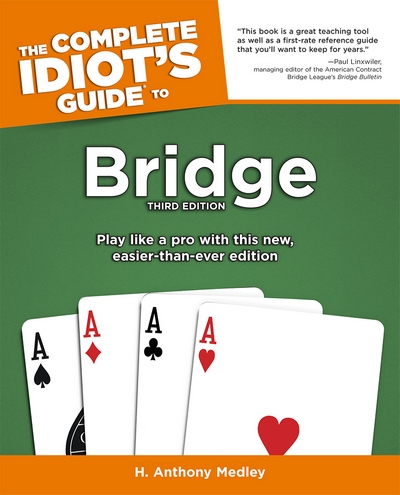| The first and second editions of Complete Idiot's Guide to Bridge by H. Anthony Medley comprised the fastest selling beginning bridge book, going through more than 10 printings. This updated Third Edition includes a detailed Guide to Bids and Responses, along with the most detailed, 12-page Glossary ever published, as well as examples to make learning the game even easier. Click book to order. Available in all bookstores and on Kindle. | ||
|
Thumbnails Nov 14 by Tony Medley Rudderless (10/10): William H. Macy’s directorial debut is a smash! This is a sensitive, poignant tale of Billy Crudup, a successful man who descends into drunkenness after a family tragedy and is rescued by discovering his deceased son’s music. As he gets involved his life takes meaning, but that’s not the end of the story. The music is good and Macy keeps admirable pace and gets first rate performances from Crudup and Anton Yelchin, both of whom perform their own singing and playing, with fine supporting performances from Felicity Huffman, Laurence Fishburne, and Macy himself. This is one of the best films I’ve seen this year. Laggies (9/10): Chick flick or no, I loved it. Keira Knightley is an amazing actress. She does things with her eyes that provide mirrors to the soul of her characters. And Chloë Grace Moretz is not far behind her. For one of such tender years, her two roles this year, as a prostitute in “The Equalizer” and a kind of wild teenager here, display an admirable range. Sam Rockwell, Jeff Weber, and Jeff Garlin round out the cast with equally persuasive performances. The Judge (9/10): Finally Robert Downey takes some time off from squandering his God-given talent on the deplorable “Sherlock Holmes” franchise and superhero twaddle like “Iron Man,” and takes on a role more befitting his talent. To see him with Robert Duvall, a good script, and fine director is long overdue. St. Vincent (8/10): Outstanding performances by Bill Murray, Melissa McCarthy, newcomer Jaeden Lieberher, and Naomi Watts as a Russian prostitute, highlight this moving, funny tale of an unlikely alignment of a cantankerous older man and an 11-year-old boy who understands him like no other person does or even tries. Fury (8/10): This has the Alpha and Omega of World War II movies. For the Omega, director David Ayer has the war completely stop when any of the main characters dies so the audience can hear their Hollywood-scripted farewell speeches, aping scenes from Terrence Malick’s dismal remake of James Jones’ “The Thin Red Line” (1998). But the Alpha more than makes up for this as it is probably one of the most realistic depictions of war battles ever filmed, and that’s most of the movie, well worth the price of admission. Gone Girl (7/10): The problem with “Gone Girl” is that it pales in comparison with the bestselling book. It’s not that Ben Affleck and Rosamond Pike are not delightful incarnations of Nick and Amy Dunne or that the supporting cast is not equally pleasing (except for an unconvincing Neil Patrick Harris). What’s disappointing is that in the first half of the movie Nick is not nearly as unsympathetic nor Amy as sympathetic as in the book. Worse, Gillian Flynn, who wrote both book and screenplay, changed the ending so that readers of the book “would not lose interest.” That makes no sense because by the end of the movie they will either have lost interest or not, and, given the gender point they’re trying to make, it’s disingenuous. Regardless, this is a fine, entertaining movie on its own. Force Majeure (5/10): The movie is filled with allegories if you’re looking for them, and the ending has all sorts of interpretations one could make. There are some funny lines, some beautiful scenes of people skiing, and it is interesting, but the story doesn’t justify a film of almost two hours duration, which is what one often gets when, as here, a writer (Ruben Öslund) directs his own script and can’t bring it upon himself to cut anything because he finds the writing so wonderful. In Swedish and English. Dracula Untold (3/10): There’s a good reason why it was untold.
|
||
